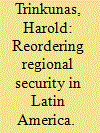| Srl | Item |
| 1 |
ID:
071631


|
|
|
|
|
| Publication |
2006.
|
| Summary/Abstract |
This article examines how states attempt to overcome collective action problems for promoting regional integration, by highlighting such attempts by members of the Association of Southeast Asian Nations (ASEAN). It considers two kinds of collective action problems: collaboration games where actors are lured to defect from an agreement in order to obtain short-term gains, and coordination games where actors face difficulty in reaching an agreement. The article argues that although ASEAN countries have not intended to establish a supranational body to resolve collective action problems, they have gradually developed feasible enforcement mechanisms by intensifying the centralized nature of regional organization. It also contends that some member states have begun to play a focal point role in resolving coordination problems resulting from accelerated regional integration and market liberalization, and the resolution of coordination problems has been pursued in a framework where extra-regional countries and environments play a significant role.
|
|
|
|
|
|
|
|
|
|
|
|
|
|
|
|
| 2 |
ID:
084509


|
|
|
| 3 |
ID:
100988


|
|
|
|
|
| Publication |
2010.
|
| Summary/Abstract |
This article analyzes Japan's motivations in opening negotiations on free trade agreements with Australia and Switzerland, highlighting intersections between domestic and international factors. While Australia is a security ally of Japan and a main source of natural resources, Switzerland is a traditional ally in World Trade Organization negotiations and considered a gateway to the European market.
|
|
|
|
|
|
|
|
|
|
|
|
|
|
|
|
| 4 |
ID:
115849


|
|
|
| 5 |
ID:
121550


|
|
|
|
|
| Publication |
2013.
|
| Summary/Abstract |
In the wake of the Cold War, regional democratization and economic liberalization were supposed to usher in an opportunity to build a common hemispheric security agenda, designed to unite the United States and Latin America in collaboration against the "new" security threats posed by organized crime and violent nonstate actors. Two decades later, the threats remain much the same, yet the hemispheric security agenda has fragmented, replaced in part by projects designed to build specifically South American regional institutions. As some scholars predicted, heterogeneous threat perceptions across the region, differences over democratization, and tensions over the effects of free trade and market liberalization have confounded the effort to build a hemispheric security agenda. Yet the efforts by former President Hugo Chávez of Venezuela to radically transform the regional security order by building a Bolivarian alliance of states as an explicit counterweight to U.S. power have also fallen short. Instead, Brazil's ascent as a global economic power and the growing prosperity of the region as a whole has created an opportunity for Brazil to organize new mid-range political institutions, embodied in the Union of South American States (UNASUR), that exclude the United States yet pursue a consensual security agenda. This emerging regional order is designed by Brazil to secure its leadership in South America and allow it to choose when and where to involve the United States in managing regional crises. Yet, Brazil is finding that the very obstacles that confounded hemispheric security collaboration after the Cold War still endure in South America, limiting the effectiveness of the emerging regional security order.
|
|
|
|
|
|
|
|
|
|
|
|
|
|
|
|